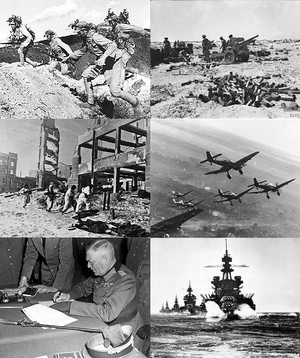Second Great War
| Second Great War | |||||||
|---|---|---|---|---|---|---|---|
 Clockwise from top left: Hekuvian nuclear bombing of Paulastra, Kiravian planes being reloaded after conducting missions in 1952, Umcaran paratroopers landing during the Invasion of Paulastra in 1949, Flordetian soldiers during the Siege of Marcus in 1951 | |||||||
| |||||||
| Belligerents | |||||||
|
| ||||||
| Commanders and leaders | |||||||
|
|
| ||||||
| Casualties and losses | |||||||
|
Military dead: over 26,000,000 Civilian dead: over 40,000,000 Total dead: over 56,000,000 |
Military dead: over 20,000,000 Civilian dead: over 28,000,000 Total dead: over 48,000,000 | ||||||
The Second Great War, also sometimes called the World War, was a global war that lasted from 1934 to 1943. The vast majority of the world's countries—including all of the Great Powers of the time - were involved. A state of total war emerged, directly involving more than 100 million people and resulting in over 64 million deaths. The major participants threw their entire economic, industrial, and scientific capabilities behind the war effort, blurring the distinction between civilian and military resources. It is marked by massive strategic bombing campaigns of industrial and civilian centers, trench warfare, the rise of mechanized warfare, and the only use of nuclear arms in war. It remains the deadliest conflict in human history.
Background
First Great War
The First Great War was fought between The Imperium of Caphiria and its overseas allies against an alliance of Sarpedonian states from 1896 to 1902, cementing its position as a predominant power on continental Sarpedon.
Decline of the Holy Levantine Empire
Caroline Wars and Recess of the Julii
Starting late in the 18th Century (in some scolarly opinions, as early as the mid-18th century), the Holy Levantine Empire entered a period of terminal decline in terms of influence over its members and the working of its core institutions. Despite the best efforts of the Imperial Court in Corcra, members of the Empire were rapidly liberalizing and eschewing centralized power in favor of various levels of devolution outside of the Imperial power structure. This process had started with the War of the Caroline Succession, after which the power of many Electors in the Empire had been stripped, particularly the Derians. The events of the subsequent Second Caroline War did little to improve the divide between the Urcean and Derian states, which later spiraled into a decline in earnest beginning with the Recess of the Julii, during which the the Apostolic Kingdom of Urcea began to act autonomously of the Empire's institutions in light of its inefficiency in maintaining order in central Levantia. It was further exacerbated by the White Revolution in Fiannria in 1823, which resulted in the dissolution of the Kingdom of Culfra and its replacement by the Republic of Fiannria. Both events served to dramatically reduce the manpower, funds, and political capital available to the Empire throughout the 19th Century. Urcea's conquest of Carolina and defeat of most of the Kingdom of Dericania in the Third Caroline War proved another body blow to the authority of the Empire and created a generation of veterans in Dericania who had been exposed to some of the ideas of Crown Liberalism held by the Urceans while captive as prisoners of war.
First Fratricide and Fourth Kin War
In the Wake of the Third Caroline War, the Peoples Spring of 1848 saw the formation of formidable groups in fifteen Imperial states which formed their own protests, revolts, and organized labor actions. These were brutally suppressed by then-Emperor Louis XI, leading to the long-winded violence of the First Fratricide. Many Derians had long feared that Urcea would attempt to consume the Kingdom of Dericania and its constituent states, and Derians now felt that the only thing keeping the Urceans away - the Imperial Court - would no longer protect them. Some speculated that Corcra would attempt to keep the “northern liberals” out of “southern politics” - fears which reached new heights in 1887, when The Kingdom of Fhainnlannachaeran openly invaded Imperial territory through Fiannria. The Imperial response to this flagrant assault on its being was the Emperor enforcing a non-engagement order, barring any of the other Holy Levantine states from coming to Fiannria’s defense. This breach of the long-standing mutual defense customs the Empire had once held flamed fears of both internal warfare and foreign conquest, shattering much of the remaining goodwill held towards the HLE in Deria. The surprise victory of Fiannria in the war proved bittersweet, as it left many feeling they were better left to their own devices than relying on the Imperial court.
Red Interregnum
At the time of the First Great War, Urcea was locked in an internal power struggle known as the Red Interregnum.